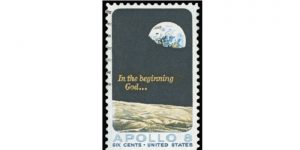
“In the beginning God created the heavens and the earth” (GENESIS 1:1).
Everyone has a worldview. We all view life through some type of lens. Certain predisposed persuasions or seemingly benign biases do, in fact, determine how each of us views our world. Presently, the Western world is engaged in a huge confrontation between competing worldviews.
I spent my boyhood years in the 1950s, when the Judeo-Christian worldview was front and center in America. Our young men and women had just returned from the European Theatre or the South Pacific at the conclusion of World War II. They married their high school sweethearts and began what sociologists now call the baby boom. We were a thankful and grateful people. Church attendance was at an all-time high, and Bible readings were every-day occurrences in public schools. We viewed our world through a modern yet moral lens.
My teenage years were spent in the 1960s. The assassination of President John F. Kennedy ushered in that decade, and something happened to the psyche of America. We became more introspective. It began to be reflected in the music of the day. Peter, Paul and Mary sang, “The answer, my friend, is blowing in the wind.” Suddenly our introspection revealed that the simple answers we thought we held were now questioned. Our worldview began to subtly change. For many, the answers to life’s questions that they thought they believed seemed to be “blowing in the wind.”
Then came the 1970s, ushered in on the throes of Watergate, Roe v. Wade and Vietnam. Society became more skeptical. Again, it was reflected in the music of the day. Billy Joel’s big hit in those days was “Only the Good Die Young.” Skepticism became the lens through which many in our culture began to view their world.
This was followed by a bit of a reprieve in the 1980s. Ronald Reagan brought new hope as he spoke about that “shining city on a hill.” Then came the 1990s. The Berlin Wall fell; the Cold War came to a sudden conclusion. Next, the new millennium was ushered in on the heels of September 11, 2001, and the War on Terror was launched with a significant effect on the worldview of many.
The changing worldviews
Even though worldviews may change across the decades, there is a single constant that does not change. The simple fact is that one’s worldview can be determined by one’s response to the first four words of the Bible: “In the beginning God . . .” If we believe these four words, then we will view our world through the lens of Scripture that does not change. If we do not, then we will continue to view our world through the lens of culture that continually changes.
Perhaps there is no other verse under such constant abuse and ridicule as Genesis 1:1. It demands the answers to three important questions: When? Who? What?
WHEN? “In the beginning”
It should be noted that history does not begin in Genesis 1:1 but back before it, way back in the eternal councils of God. There we find three things: love, glory and eternal life.
Before Genesis 1:1, there was love. In His high intercessory prayer, the Lord Jesus prayed, “Father, I desire that they also whom You gave Me may be with Me where I am, that they may behold My glory which You have given Me; for You loved Me before the foundation of the world” (John 17:24). Before the foundation of the world that is reported in Genesis 1:1, there was love.
Back in the eternal recesses of God, before the events of Genesis 1:1, there also existed glory. Earlier in that same prayer, Jesus had prayed, “Now, O Father, glorify Me together with Yourself, with the glory which I had with You before the world was” (John 17:5). Long before what we refer to as the “beginning,” the glory of God existed.
There also existed the promise of eternal life back before the “beginning.” The apostle Paul, writing to Titus and inspired by the Holy Spirit Himself, penned it thus: “In hope of eternal life which God, who cannot lie, promised before time began” (Titus 1:2). Our hope of eternal life and its promise was there “before time began,” before “the beginning.”

One should not think of Genesis 1:1 as the beginning of everything, for “in the beginning was the Word, and the Word was with God, and the Word was God.” So that there be no mistake about whom he spoke, the apostle John added, “And the Word became flesh and dwelt among us, and we beheld His glory, the glory as of the only begotten of the Father, full of grace and truth” (John 1:1, 14).
WHO? “God”
The Bible translates the Hebrew word Elohim here as God.
The significance is that the word is in its plural form. It is a plural noun, thus hinting to us in the initial verse of Scripture that God is one pictured as three: Father, Son and Holy Spirit. Interestingly, the verb created, which follows this noun, is in the singular form, seemingly making a mockery of grammar. Yet it should be singular in that He is the great Three in One. We see this truth revealed later in Genesis 1 when we read, “Let Us make man in Our image” (Genesis 1:26, emphasis added). And then the following verse reads, “So God created man in His own image” (v. 27, emphasis added).
The doctrine of the Trinity is one of the great mysteries of the Bible. Yet, beginning with this first verse, the idea of the Trinity is woven throughout the Scripture. It is often illustrated by its similarities to H2O, two parts hydrogen and one part oxygen. We all know this to be water — a liquid. However, it can also be a solid (ice) or a vapor (steam). Yet, in all three manifestations, it is still the same in nature: H2O. And so it is with God manifesting Himself in three persons.
WHAT? “created the heavens and the earth”
There is a huge difference between creating something and making something. Many of us have made things, but none of us has ever created anything from nothing. A cabinetmaker may make a beautiful cabinet out of wood. However, he is totally unable to create the wood itself. The Hebrew word from which we translate created in Genesis 1:1 carries with it the connotation that something is created out of nothing.
This physical universe was spoken into existence by God Himself. Is it possible that, in the entire vast expanse above us, the solar systems, the constellations and the measure-less space, all having billions of stars moving in clocklike precision, do so without a master Creator and Designer? Is it also possible that no one else among the billions of people presently on the planet has DNA or a thumbprint quite like yours? And is that kind of creativity and variety possible without Someone behind it all who sees you as indescribably valuable?
Memorize Genesis 1:1 this week, meditate on the rich meaning of each of these sacred words and remember that those first four words of the Bible determine one’s personal worldview. Yes, indeed, “In the beginning God!” Make these four words the lens through which you view your world.
Taken from The Joshua Code by O.S. Hawkins. Copyright © 2012 by O.S. Hawkins. Used by permission of Thomas Nelson.
- S. Hawkins has served pastorates, including the First Baptist Church in Fort Lauderdale, Florida, and the First Baptist Church in Dallas, Texas, for more than 25 years. A native of Fort Worth, Texas, he has a BBA from Texas Christian University and his MDiv and Ph.D. from Southwestern Baptist Theological Seminary. For almost a quarter of a century, he has served as president of GuideStone Financial Resources, with assets under management of $20 billion, serving 250,000 pastors, church staff members, missionaries, doctors, university professors, and other workers in various Christian organizations with their investment, retirement and benefit service needs. He is the author of more than 40 books, and speaks regularly to business groups and churches all across the nation. All of the author’s royalties and proceeds from the entire Code series go to support Mission:Dignity. You can learn more about Mission:Dignity by visiting MissionDignity.org.
For more articles like this, visit https://www.goodnewsfl.org/

Comments